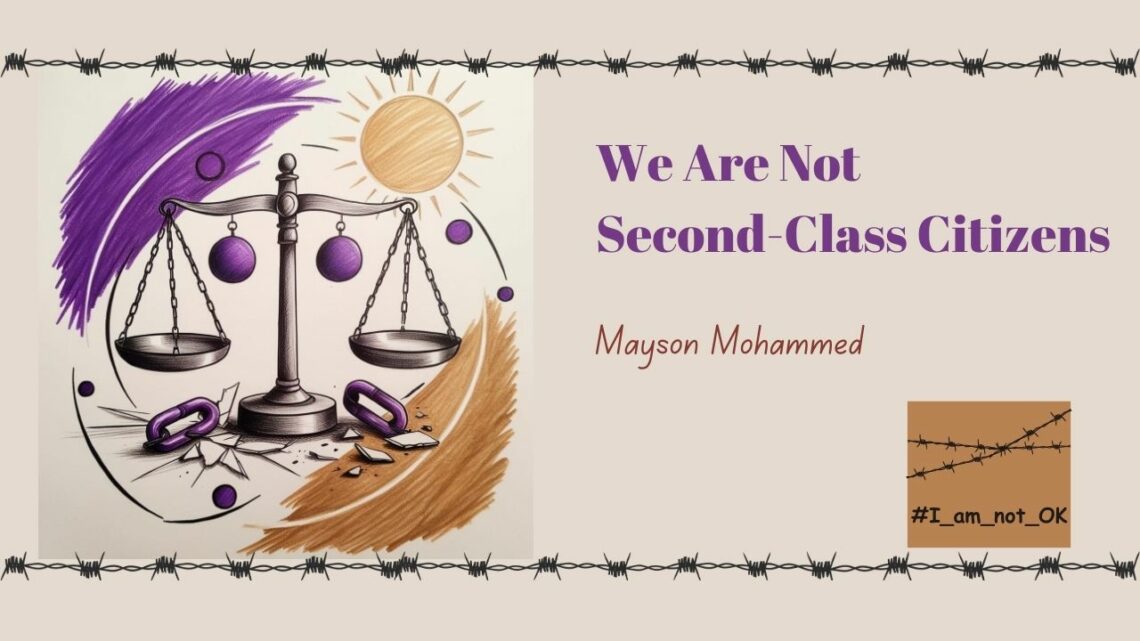Mayson Mohammed
The night crept heavily over the alleys of the old city as Layla sat by her small window, gazing at the cloud-filled sky. Each time the wind’s howl intensified, it felt like it whispered stories of other women, burdened with pain and silence. Layla knew these tales were not far removed from her own; she was living one of them herself.
Layla’s story began years ago when she was a little girl watching her mother endure relentless cruelty. At that time, she could not understand why her mother tolerated repeated insults or why she quietly dried her tears in the house’s dark corners. Growing up, Layla became accustomed to this recurring scene—it was familiar but never lost its sting.
One night, as Layla watched her mother, she sat beside her and asked, “Why don’t you leave him?” Her mother paused for a moment, then replied, her voice heavy with fear and disappointment, “Because if I leave him, no one will protect you. There is no law to safeguard our rights, no shelter for women like us.”
Layla never forgot her mother’s words—words that etched into her heart a determination to confront an unjust reality. As the years passed, Layla grew up and became a law student, driven by a passion to understand the laws that shaped her life and the lives of many women around her.
She began to see firsthand the fragility of the legal system and its lack of justice. The penal code, which placed women in a subordinate position to men, and provisions that treated violence as a trivial matter, were daily knives stabbing at women’s dignity.
Layla believed that silence was no longer an option. Like every woman, she deserved a better life. But with every step she took toward change, she collided with barriers—society, family, and even the law itself, which had never been an ally.
One day, during a lecture on Syrian penal law, the professor discussed legal texts related to domestic violence. His tone implied a justification for actions classified under “customs and traditions.”
Layla sat among her classmates, a diverse group of students, each carrying a different story. The professor’s words ignited a heated debate, turning the lecture hall into a battleground for discussions on the injustices women endure under laws designed to restrict rather than protect them.
Raising her hand, Layla said firmly, “Professor, how can we call this law when we know it protects the perpetrator more than the victim? How can women be treated as second-class citizens?”
Silence fell for a moment before a cautious classmate responded, “But these laws are not new; they reflect societal realities and may be the best way to ensure stability.”
Layla could not hold back her frustration, replying with barely contained anger, “What stability are we talking about? Stability built on silence and fear? Are laws that grant reduced sentences to killers under the guise of ‘honor crimes’ just? Is this a stable society or one afraid to face the truth?”
Yasmin, a classmate silently enduring domestic violence, joined the discussion, speaking in a low but profound voice: “I don’t think these laws merely reflect our reality; they shape it. When children grow up in an environment where violence against women is normalized, they perpetuate the cycle endlessly. Change begins here—with the law.”
Over time, the debate turned into an open discussion among the students. Some argued that laws could not transcend societal culture and that any radical change would face fierce resistance. But Layla stood firm, saying, “The law is not just a mirror of society; it’s a tool to change it. If we keep justifying discriminatory laws as reflections of our culture, we won’t take a single step forward. We need laws that protect everyone, that don’t discriminate between men and women, and that don’t treat violence as a private or family matter.”
The discussion extended beyond the classroom. Layla and her classmates continued to talk about practical examples, from legal provisions that remained silent on violence against women to real-life cases they had experienced or heard about. For Layla, these conversations marked the beginning of her personal battle. She didn’t stop at words—she started reading and researching successful international laws and analyzing how they could be implemented in Syria.
Over time, these debates began to influence many of her classmates. Some started to see the law from a new perspective, while others felt that change had to start with their generation. For Layla, these discussions represented hope that awareness could grow even in the most challenging environments.
In one lecture, Layla declared loudly for all to hear, “The reality of women in our country will not change unless we, the next generation of lawyers, unite to rewrite laws that are fair to us all. Change won’t be easy, but it is possible, and we have the power to begin it.”
Her words embodied an unbreakable hope and a deep desire for justice and equality—a dream of a day when women’s rights are upheld and violence and injustice become mere memories of the past, not just in legal texts but in the details of everyday life.




